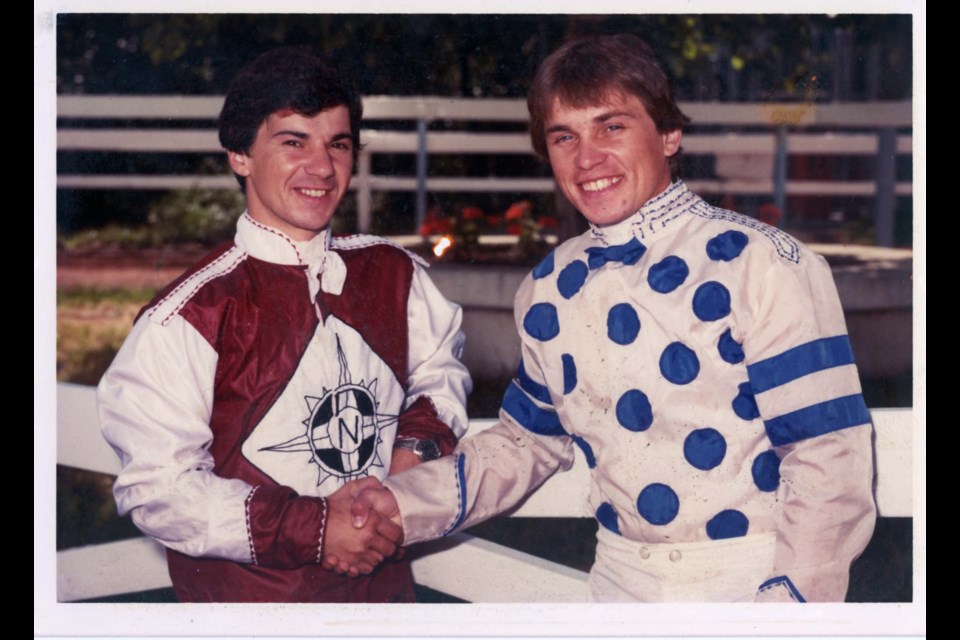The five Turcotte brothers are the stuff of legends. They rose from extreme poverty to become jockeys in North America’s most prestigious thoroughbred horse races. Throughout their 37-year run, this jockey dynasty won purses close to $55 million.
However, extraordinary success can also breed extraordinary loss. One by one, the brothers were felled with life-threatening injuries, depression, alcoholism and suicide.
Ron Turcotte, the eldest brother, was vaulted to international acclaim in 1973 after riding Secretariat, the fastest Triple Crown winner to date. Secretariat won the Derby, the Preakness and the Belmont in record times still unsurpassed today.
This spring was the 50th anniversary of Secretariat’s Triple Crown glory. And author Curtis Stock, a former Edmonton Journal track writer, released The Turcottes, The Remarkable Story of a Horse Racing Dynasty.
It is a riveting actual account ripped from newspaper articles, interviews and in-person conversations. Part biography, part oral history and part non-fiction, the 357-page read has the makings of a triumph-to-tragedy Hollywood movie.
“I actually thought about doing this 20 years ago, but I couldn’t do it justice. When COVID hit, I said ‘I’ve got no more excuses,'” said Stock in a telephone interview. “There were ups and downs, highs and lows, triumphs and tragedy. The family went through a lot. It’s an amazing story from start to finish about how they became good and things knocked them down.”
The Turcottes grew up in Drummond, NB as part of a Catholic family with 14 children. The impoverished family worked hard at logging operations but money was never enough. Ron left home to find an easier, higher-paying job in Toronto. At first he was paid $3 for picking 1,000 worms for an angling shop.
Quite by accident, his rooming house landlord invited him to watch the Kentucky Derby on an old black and white TV. Ron was hooked. Short of stature, he went to Woodbine track and applied for an entry-level job. He worked with horses at the logging camps, and had a knack for understanding thoroughbreds. He quickly worked his way onto the jockey’s saddle.
In a few years Noel, Rudy and Roger followed in their older brothers footsteps. Yves, who now lives in St. Albert, is 20 years younger than Ron and was eventually lured by the racetrack. He won his first race in 1981 but forced into retirement in 1999 after multiple concussions and head injuries. Today Yves is the senior steward at Century Mile Racetrack and Casino.
Back in the 1970s Ron was riding the pinnacle of success. But his phenomenal streak ended in 1978 after he was thrown from his horse, Flag of Leyte Gulf. He suffered multiple spinal injuries, leaving him quadriplegic.
The name Turcotte was renowned in every North American paddock, and it assisted the younger brothers in landing jobs. By the late 60s and early 70s, the middle brothers were earning sizable purses. For instance, in 1975 Rudy won purses totalling $1,268,727 while Roger won $1,536,362. Jockeys are entitled to 10 per cent of a purse.
But like every jockey, they paid a hefty price. Jockeys are required to weigh less than 105 pounds and follow a super-strict weight-loss regimen. To maintain the feathery weight, jockeys swallow diuretics and laxatives like candy. They’ll spend hours in a sauna or run for miles in a rubber suit and dehydrate their bodies.
Despite the intense pressure to keep weight off, the high-adrenaline and fast action is a big attraction.
“It’s the thrill of winning. That day you are the best in that class and nobody can take it away from you,” said Yves in an interview.
But maintaining a low weight, disordered eating habits, repeated injuries and fear of losing jobs create a state of depression, sadness and anxiety. Roger and Noel’s lives tragically ended in suicide, while Rudy suffered from depression and died of alcohol-related issues.
Yves describes the track as a sport that by its makeup fosters depression.
Of Noel, Rudy and Roger, he says, “You drink when you win. You drink when you lose. You get discouraged. That was their downfall. They didn’t work regular jobs before they started racing. It wasn’t a happy place. It was a safe place. The real world is scary when you don’t know anything else. It’s comfortable and when you don’t win, you get depressed. You’re only as good as your last ride.”
Yves spoke with Stock on many occasions and contributed family and racetrack anecdotes for the book. While Stock spins a fast-paced read laced with corroborating facts, Yves would have liked to see a broader discussion on mental illness and the depression the many jockeys undergo.
“Depression goes with you when you start to go downhill," he said. "Hockey, football, basketball. There’s team to help players. But in horse racing, there’s none of that. When people don’t want you anymore, it can be quite depressing. There’s no one to take you aside and help you. If my brothers had all got help, they wouldn’t have gone down. They say it was the booze that killed them. It was the depression.”
The Turcottes, The Remarkable Story of Horseracing Dynasty is published by Firefly Books.



